The same year that Julia and Michael Phillips produced Taxi Driver, they also released a comedy, one that’s been long forgotten, rarely broadcast, and relatively hard to find. In 1976, in the thick of that decades’ disaster movie trend, The Big Bus came out, presaging the classic Airplane! by four years. There’s a big difference between the two: Airplane! is tight, with writing, performances, and characterizations that’ve become more iconic than many of the people in the movie. It’ll surely be in Julie Hagerty’s eventual obituary, but not the first line.
If you’ve ever read, or skimmed, Julia Phillips’ 1000+ page 1991 Hollywood tell-all You’ll Never Ear Lunch in This Town Again, you know that Melinda Dillon never could’ve played Phillips, who died 21 years ago last month. Her death from cancer at 57 was a huge loss, at the very least for Hollywood gossip, because she never had the chance to respond to or critique Peter Biskind’s Easy Riders, Raging Bull, the 2003 book that has unfortunately become the definitive text on New Hollywood. Biskind’s book is fine, but he’s an asshole, and often daft and talking out of his ass—besides, he wasn’t there. You’ll Never Eat Lunch in This Town Again has never gone out of print, but without Phillips’ snappy and sarcastic public appearances, there’s no one to hock a book that leaves no one unscathed. Scorsese, De Palma, Spielberg, De Niro, Pacino, Diller, on and on and on…
Phillips was the first woman to win a Best Picture Oscar (for The Sting in 1974), but she’s barely known today, despite endlessly watchable interviews and a doorstop book far better and juicier than Biskind’s. Regarding The Big Bus, Phillips spares only four pages in her entire book: among tall trees like The Sting, Taxi Driver, and Close Encounters of the Third Kind, her second “failure” at comedy—after Steelyard Blues—devolved into “outrageous mediocrity” after rushing into production with director Jim Frawley (“Jim Fraud-ly” according to Phillips). “A great deal of money is spent on sets, and cast. We rush into production. It is clear from the first few days of dailies that this guy has almost no talent… At one point, Joe Bologna has the temerity to scream to Frawley, ‘What’s my motivation?’ And I think but don’t say, To be funny, motherfucker.”
Phillips’ appearance on Donahue in 1991 is just as entertaining as The Big Bus, which is a really charming and fun movie—as long as you discover it one day, maybe sick, clicking through Prime Video after finding out that The Holy Rollers—a movie featuring Monica Gayle from the early-1970s that I can’t find any trace of anymore—isn’t available anymore. Stockard Channing is the “bus attendant” of The Big Bus, and she ends up nearly drowning in a sticky stew of cola and orange soda and donuts. The movie begins with a title card about other disaster movies of the time, including an explicit reference to the previous year’s The Hindenburg, but keep in mind there were still movies like Meteor, Avalanche, and two more Airport sequels to endure. It doesn’t help that The Big Bus is a charming mess, but a mess nonetheless, and if Frawley didn’t have such a wonderful set and production design with The Big Bus, he would be easy to discount as a talentless hack.
The guy may not be able to direct his actor or muster one joke out of any of them, unlike the rapid-fire delivery of Airplane! But what’s amazing about The Big Bus, along with The Gumball Rally from the same year, is the extraordinary Technicolor production design. I didn’t see Bullet Train, but the way it looked and everything it looked like it was trying to do, reminded me of The Big Bus—a ringing endorsement, I know. Unlike The Gumball Rally, which was handsomely directed by Chuck Bail with tons and tons of stunning telephoto photography of the United States in the mid-1970s, all of the fun in The Big Bus comes from seeing all of these 1970s character actors, many of them familiar from Robert Altman movies, fucking off in the coolest looking bus that’s ever been in a movie. It doesn’t hurt that Stockard Channing looks like Elizabeth Taylor, even if she’s in a jumpsuit; she’s the only performer able to get a grip on this thing, and it’s through that soda swimming set piece.
I don’t usually have a physical reaction to movies; past laughs and tears, it takes a lot to make me nauseous, my blood run cold, but the image of Channing not just drenched but nearly drowning in brown cola and uncooked donuts made me feel like I’d eaten an entire tub of butter, inhaled the excess of 1970s cinema and the grandeur of practical effects and elaborate sets that look both pristine and already dirty somehow, a quality that so much American cinema of the 1970s has, all the way down to these left-handed curios that might be remembered by the kids that saw it when it came out in 1976.
—Follow Nicky Smith on Twitter: @nickyotissmith

